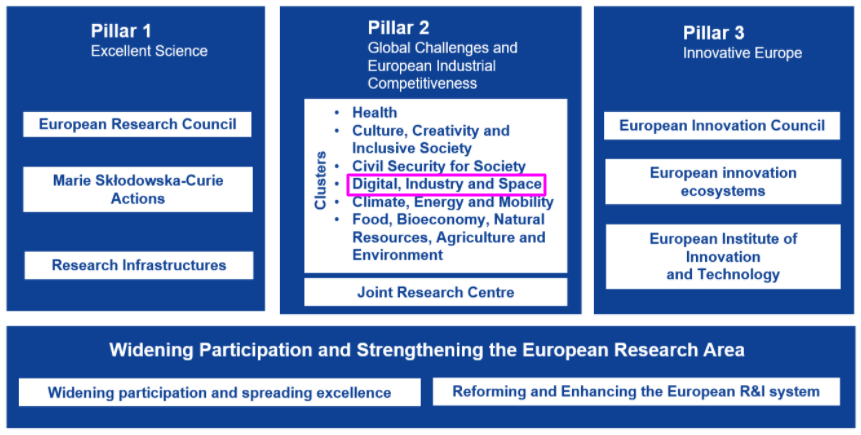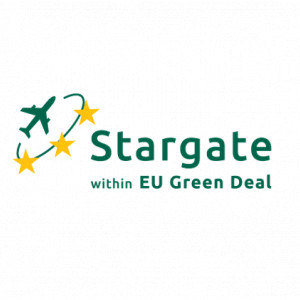 \
&
Contact us
\
&
Contact us
 \
&
Contact us
\
&
Contact us
Published on | 4 years ago
Programmes Digital, Industry & Space ICTHorizon Europe, the next framework programme for research and innovation, will replace Horizon 2020 as from 2021 onwards. However, both the high level structure and the practical implementations are currently still under development, and the situation is not very clear, which leads to quite some confusion.
Therefore, let's have a look at what is actually known so far concerning the topics that are currently in the ICT Work Programme. Keep in mind, things are constantly progressing, information can get outdated pretty quickly.
As can be seen on the image below (source), HorizonEU will be structured in pillars, but it differs quite a bit from Horizon2020. Most of the Industrial Leadership (LEIT) and Societal Challenges (SC) topics will move to Pillar 2. What is currently called ICT can be found (together with NMBP and Space) in Cluster 4, under the name Digital.

Of course, there are quite some digital (ict) aspects in other the clusters/pillars, but then it will be more as a building block to reach a goal, rather than the pure advancement of the digital technology. Which does not differ from Horizon2020.
The European Commission discusses the development of the work programme and the implementation of Horizon Europe with the Member States in the so-called programme committee. Flanders represents Belgium in the programme committee related to Cluster 4. If you would like to get actively involved in the preparation of the work programmes and the implementation of Horizon Europe, you can contact karel.boutens@vlaanderen.be.
First observations: the draft is long (400 pages) and clearly a working document. Different sections have different levels of completion and a lot of concrete info (budget allocations, deadlines). Not to mention the new jargon that needs to be understood.
The EC has currently defined 4 Key Strategic Orientations (KSOs) globally for HorizonEU. At the cluster level, additionally 6 Expected Impacts (EIs) are being defined. When you take a closer look, you'll notice that both are related. For cluster 4, the most 3 relevant KSOs, with their expected impacts are
| Promoting an open strategic autonomy by leading the development of key digital, and enabling and emerging technologies, sectors and value chains |
|
|
|
|
| Making Europe the first digitally led circular, climate-neutral and sustainable economy |
|
| Creating a more resilient, inclusive and democratic European society |
|
The destinations are the big chapters that structure the cluster work programme. You'll quickly notice that each actually relates to one of the beforementioned Expected Impacts (as a hint, the numbering above relates to the one below). Call topics will get their acronym from this. For Cluster 4 it concerns:

For most of the destinations, you can see quite quickly how they roughly relate to the previously existing domains, being NMBP, ICT and SPACE. The typical ICT topics move mostly to destinations 3,4 & 6.
Each destination itself will be further subdivided in headings. Currently we don't have details on this, but it will differ from the 38 sections, in a previous version of the Cluster 4 draft WP). Were the sections were the main research themes that will be eligible for funding, the structuring in headings is expected to be more goal-oriented. Anyhow, you can see it as a sphere (eco-system) in which consortia will be operate. Within these headings, you'll find around 300 call topics (depending on how you count).
Though a new structure can be expected, you can deduct the topical domains from the sections :
There are quite some partnerships defined in the HorizonEU universe... Think of other EU programmes, Joint Undertakings and other PPPs (e.g. HPC, Photonics) and EIT sections (EIT Digital, Manufacturing). In the draft work programme, you'll find clear links between several call topic domains and these partnerships, but when you try to draw a diagram, you'll notice you (currently) rather get spaghetti than clarity... Let's hope that future drafts manage to structure this better.
The missions are best seen as overarching global themes that touch to topics that are near to the citizen. They will complement mostly the existing call topics, and try to add theme-linking and focus. But the core-funding will not be there. Especially not for ICT, as this is more a driving technology for solutions in other fields, rather than an end-station itself.
When talking about synergies, the EC mostly refers to bigger and more political themes like the "green and digital transformation", the "new industrial strategy for Europe", the "circular economy action plan"... There are 18 programmes mentioned in the documents, but for ICT-related themes, it are mostly the Digital Europe Programme (which is more about deployment and less about research, but its Digital Innovation Hubs (DIHs) will most certainly also play a role in HorizonEU), the Eu Data Spaces, the AI Testing Facilities, and (in to a lesser extent) EDF and InvestEU.
The EC made it pretty clear that a final version will be published in the first quarter of 2021, but the process until that moment is not very fixed. There is still a lot to discuss, restructure and also the negotiations on budgets and governance structures still need to crystalize.
You can expect at least one, maybe more, updated draft work programme that takes into account the feedback (given by member states, (industry and research) experts, lobbyists... As a matter of fact, before mid October a new version is expected, so hold your horses and don't deep dive into what is available now...
And finally, again, if you would like to get actively involved in the preparation of the work programmes and the implementation of Horizon Europe, you can contact karel.boutens@vlaanderen.be.
We offer news and event updates, covering all domains and topics of Horizon Europe, Digital Europe & EDF (and occasionally, for ongoing projects, Horizon 2020).
Stay informed about what matters to you.
By signing up, you can opt in for e-mail notifications and get access to
a personalised dashboard that groups all news updates and event announcements in your domain(s).
Only for stakeholders located in Flanders
Digital Europe AI, data & cloud Advanced Digital Skills Deployment: Best use of technologies
The first Digital Europe calls in the domains AI-continent, advanced digital skills and deployment & best use of digital technologies are now open for submission. Deadline to submit proposals for these calls is 2 September 2025. Please find here below an overview of all related call topics: AI-continent Apply AI: GenAI for the pu... read more

The Stargate project obtained funding under the special Green Deal call of Horizon 2020, more in particular under the topic of “green ports and airports”. It received the maximum score of the evaluators and was selected out of more than 40 projects. Stargate’s purpose is to prove that sustainable aviation is possible and happening. It focuses on the further decarbonization of the aviation industry, the improvement of local environmental quality and the stimulation of the modal split. Together with a consortium of 21 European partners with a diverse and rich expertise (airports, community partners, knowledge institutions, consultants, local governments, …), Brussels Airports takes the lead as lighthouse airport to develop and implement innovative solutions. Results that prove successful can be deployed at the fellow airports (Toulouse, Budapest, Athens). Over the course of the coming five years, the consortium will exchange knowledge to investigate and realize more than 30 concrete projects.